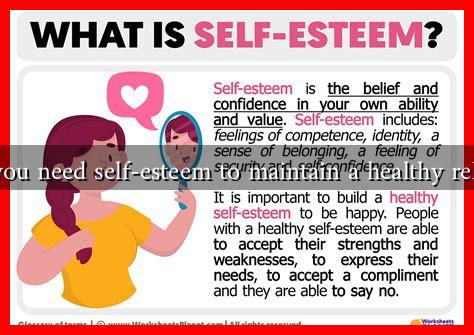-
Table of Contents
Why You Need Self-Esteem to Maintain a Healthy Relationship
Self-esteem plays a crucial role in the dynamics of any relationship. It influences how we perceive ourselves, how we interact with others, and how we respond to challenges within a partnership. Understanding the importance of self-esteem can help individuals foster healthier, more fulfilling relationships. This article explores the connection between self-esteem and relationship health, supported by research, examples, and practical insights.
The Foundation of Self-Esteem
Self-esteem refers to the subjective evaluation of one’s own worth. It encompasses beliefs about oneself, emotional states, and the way individuals perceive their abilities and value. High self-esteem is characterized by confidence, self-acceptance, and a positive outlook, while low self-esteem often leads to self-doubt, insecurity, and negative self-talk.
How Self-Esteem Affects Relationships
Self-esteem significantly impacts various aspects of relationships, including communication, conflict resolution, and emotional intimacy. Here are some key ways in which self-esteem influences relationship dynamics:
- Communication: Individuals with high self-esteem are more likely to express their thoughts and feelings openly. They can communicate their needs without fear of rejection, fostering a more honest and transparent relationship.
- Conflict Resolution: High self-esteem allows individuals to approach conflicts with a constructive mindset. They are less likely to resort to defensive or aggressive behaviors, making it easier to find common ground and resolve issues amicably.
- Emotional Intimacy: Healthy self-esteem enables individuals to be vulnerable with their partners. This vulnerability is essential for building emotional intimacy, as it encourages trust and deeper connections.
The Consequences of Low Self-Esteem in Relationships
Conversely, low self-esteem can lead to a host of challenges in relationships. Individuals with low self-esteem may experience:
- Insecurity: Constantly questioning their partner’s feelings or loyalty can create unnecessary tension and conflict.
- Jealousy: Low self-esteem can lead to feelings of inadequacy, resulting in jealousy and possessiveness that can suffocate a relationship.
- Fear of Abandonment: Individuals may become overly clingy or dependent, fearing that their partner will leave them due to their perceived shortcomings.
Case Studies and Statistics
Research supports the notion that self-esteem is vital for healthy relationships. A study published in the journal Personality and Individual Differences found that individuals with higher self-esteem reported greater relationship satisfaction. Furthermore, a survey conducted by the American Psychological Association revealed that couples with high self-esteem were more likely to engage in positive communication and less likely to experience conflict.
Consider the case of Sarah and John. Sarah struggled with low self-esteem, often doubting her worth and feeling unworthy of John’s love. This insecurity led her to frequently question John’s commitment, creating tension in their relationship. After seeking therapy and working on her self-esteem, Sarah learned to communicate her feelings more openly and trust John’s love, resulting in a healthier, more balanced partnership.
Building Self-Esteem for Healthier Relationships
Improving self-esteem is a journey that requires self-reflection and effort. Here are some strategies to enhance self-esteem:
- Practice Self-Compassion: Treat yourself with kindness and understanding, especially during difficult times.
- Set Realistic Goals: Achieving small, attainable goals can boost your confidence and sense of accomplishment.
- Surround Yourself with Positive Influences: Engage with supportive friends and family who uplift you.
- Seek Professional Help: Therapy can provide valuable tools and insights for building self-esteem.
Conclusion
Self-esteem is not just a personal attribute; it is a fundamental component of healthy relationships. High self-esteem fosters open communication, effective conflict resolution, and emotional intimacy, while low self-esteem can lead to insecurity, jealousy, and fear of abandonment. By recognizing the importance of self-esteem and actively working to improve it, individuals can cultivate healthier, more fulfilling relationships. Remember, a strong relationship begins with a strong sense of self.




